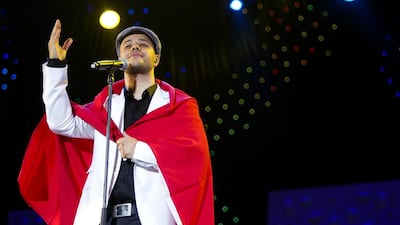He is arguably the nasheed genre’s biggest star. In the space of six years, 33-year-old Maher Zain has grown from a promising talent to headlining arena shows across Europe and the Arab world.
Speaking before an open-air performance to more than 30,000 fans at the Mawazine Festival in Morocco, a relaxed Zain credited his family and friends for keeping him grounded.
“ I am blessed to have a good team who keep reminding me of who I really am and why I am doing this, and that’s really to inspire people in a good way,” he says.
“As people, let alone just musicians, we have a responsibility to deliver a positive message. I am trying do that with whatever talents I am gifted and it just happens to be music.”
It is this greater perspective, Zain says, that is guiding his work – a journey for which he ditched a promising pop-music career to instead explore the Islamic devotional music genre of nasheed.
Born in Tripoli, Zain moved to Sweden with his parents when he was 8. It was there, in 2005, that the aspiring singer struck a friendship with up-and-coming music beat-maker Nadir Khayat, from Morocco, who went on to become chart-busting producer RedOne.
With a shared love of pop music and R&B, they both moved to New York a year later to focus on their musical careers, a time during which Zain did some production work for American pop singer Kat DeLuna.
His return to Sweden coincided with a spiritual awakening. However, where other former artists chose to leave music all together in such circumstances, Zain decided to devote his songwriting talent and energy to nasheed.
"I believe that music is music and it is just the content that differentiates from each other," he says. "For example, I am a huge Michael Jackson fan. I love Man In the Mirror. I also love Louis Armstrong's What a Wonderful World. I love these because they talk about love, which I consider one of God's biggest blessings."
From Zain's two albums to date, it was his 2009 debut, Thank You Allah, that had the biggest effect due to the popular singles Insha Allah and Ya Nabi Salam Alayka.
Both tracks, which clocked more than 100 million YouTube views between them, showcase his winning blend of evocative spiritual lyricism and well-constructed pop songwriting.
On Insha Allah, for instance, his crystalline vocals would sound equally at home in a Backstreet Boys track, let alone a nasheed song.
With Zain's global popularity growing, particularly in Malaysia and Indonesia, he returned to the studio regularly to record in a variety of languages. There are English, French, Arabic, Turkish, Malay and Indonesian versions of Insha Allah, and an Urdu version Allahi Allah Kiya Karo is also available.
Zain credits his knowledge of the Swedish language for helping him to navigate his way around the foreign words.
“In Swedish, there are three letters that I find help me with all languages,” he says.
“When I am singing in another language, normally what I do is write the words down phonetically and I also have someone with me in the studio to guide me to make sure I get it right.”
To accommodate his more conservative fan base, Zain has also released a cappella versions of his albums. While respecting their views, Zain obviously does not share the opinion that music is haram [forbidden] in Islam. It’s all down to the message that an artist is trying to convey, he says.
“I’d rather not delve into the discussion of what is halal and haram, as there are people and scholars immensely more qualified than myself to comment on such things,” he says.
“When it comes to music generally, there is a difference of opinion between the scholars and I chose to side with those who agree that it is halal because I can use it to deliver a message that I believe in.”
Zain says he has never felt lyrically limited when singing nasheeds.
“They are not only singing about God,” he says. “The religion is not just prayers and being in the mosque. It’s the way we live our life. So I sing about everything we experience in life and what I am going through.
“I mean, I have sung three love songs – two for my wife and one for my daughter.”
Regarding the future of nasheed, Zain believes it will grow to become more than simply a creative pursuit, and can play a major role in changing perceptions of Islam.
“I do think it can help in bringing positive change,” he says.
“It can give a view of people of Islam that’s different than what people and the media think. It provides a glimpse that Muslims are normal and, just like anyone else, we feel love, have families and enjoy art.”
• Next week: Akon talks about bringing hope to Africa and his much-delayed new album


